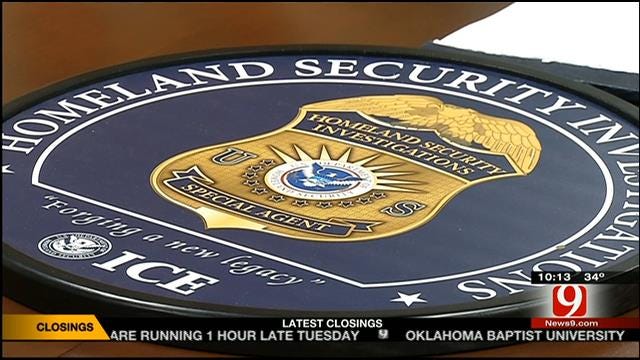Why More Illegal Immigrants Call Oklahoma Home
Oklahoma has the fastest rise in people living in the United States without legal status. The Pew Research Center also says there are 75,000 undocumented immigrants, mostly from Mexico, who call Oklahoma home.Monday, February 3rd 2014, 11:30 pm
Oklahoma has the fastest rise in people living in the United States without legal status. The Pew Research Center reports there are 75,000 undocumented immigrants, mostly from Mexico, who call Oklahoma home.
On any given day, Border Patrol Protection Agents tell me 16,000 people will enter through El Paso to come into the U.S. legally. Yet, the Pew Hispanic Center found 11 million are in America illegally. That's the population of Oklahoma, Missouri and Arkansas combined. They're not staying in border cities. Border agents said illegals are cartel members smuggling drugs and weapons bound for Oklahoma.
Border Enforcement Agent Oscar Hagelsieb said, "A lot of the narcotics being smuggled were directly taken, didn't take stop in El Paso, didn't make a stop anywhere else. Directly from the border to Oklahoma."
I met with a group of Homeland Security Border Enforcement Investigators in El Paso. They let me in on the lives of criminals who cross the border. Agents tell me Oklahoma City is one of our nation's biggest distribution points for a potent and profitable methamphetamine referred to as Mexican ice. One reason is the central location, but agents say there's also a smaller presence here of law enforcement dedicated to these crimes, compared to the border and larger cities like Dallas and Houston.
"It directly affects the crime in Oklahoma City," Hagelsieb said. "A lot of the drugs and illegal immigration that come in will end up in inner cities like Oklahoma City."
Most illegal immigrants are not living a life of crime. Jessica Vazquez was just 5 years old when her family escaped the violent-infested slums of Nuevo Laredo, Mexico for Oklahoma City.
"I don't remember anything at all (about Mexico)," Vazquez said. "The only memories are photos brought over."
Her family tried to come to America the right way and applied for citizenship.
"Our petition was accepted right away but then they said there was a really long waiting period," Vazquez said. "We were like how long do we have to wait. They said oh it can take up to 10, 15, 30 years. My parents said we don't have 30 years to wait in Mexico. When parents grow up in poverty and there's gang violence coming in, they'll do anything to protect their children."
Now 20 years old, Jessica is an honors student on an academic scholarship at Oklahoma City University. She's also a member of the rowing team. Her family is still on that same waiting list for a green card.
"It's not like I just want to be undocumented," Vazquez said. "It's virtually impossible to become legalized under this system."
Even though Jessica is undocumented, she is here legally under the Deferred Action for Childhood Arrivals. It is a relief from removal for children who were brought into the country without inspection or overstayed their visa. It is for children who entered the U.S. before 2007 and before the age of 16. The child must have been continuously present in the U.S. from 2007 to the present. In addition, the child must be in school or a GED program or have graduated from high school. DACA status provides a type of pseudo-status that protects an individual from removal and authorization to work in the United States.
We have more information on immigration laws and efforts to reform them on News9.com.
More Like This
February 3rd, 2014
November 13th, 2024
October 28th, 2024
October 17th, 2024
Top Headlines
December 26th, 2024
December 26th, 2024
December 26th, 2024
December 26th, 2024










